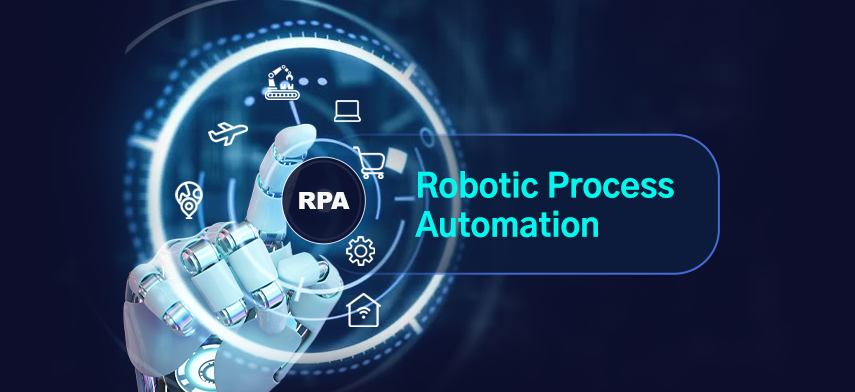In today’s fast-paced digital landscape, organisations constantly seek innovative ways to streamline operations, reduce costs, and enhance efficiency. Robotic Process Automation (RPA) has emerged as a transformative technology, empowering businesses to achieve these objectives. In this in-depth exploration, we will delve into the realm of RPA service providers, shedding light on their significance, the benefits they offer, and the top players in the industry.
Understanding RPA and Its Impact
Robotic Process Automation, or RPA, is a game-changing technology that leverages software robots (bots) to automate repetitive, rule-based tasks in business processes. These bots mimic human actions, interacting with digital systems and applications, making RPA a versatile solution across industries such as insurance finance. RPA’s impact on businesses is profound, resulting in increased operational efficiency, reduced errors, cost savings, and improved employee satisfaction. By automating routine tasks, employees can focus on more value-added activities, driving innovation and growth.
RPA service providers play a pivotal role in successfully adopting automation in organisations. They bring expertise, experience, and technology solutions that enable businesses to harness the full potential of RPA. These providers offer a range of services, from consulting and implementation to maintenance and support, tailored to each client’s unique needs.
Key Benefits of RPA Services
Cost Reduction: RPA eliminates the need for manual labour in repetitive tasks, resulting in significant cost savings over time.
Enhanced Accuracy: Bots perform tasks precisely, reducing the risk of human errors and associated costs.
Increased Productivity: Automation helps employees to focus on strategic and creative tasks, boosting overall productivity.
Scalability: RPA solutions can scale up or down based on business needs, ensuring flexibility.
Improved Compliance: RPA helps ensure compliance with regulations and standards by consistently following predefined rules.
Real-World Use Cases of RPA
Robotic Process Automation (RPA) has rapidly gained prominence across industries due to its versatility and ability to streamline various business processes. Applied across various industries and business functions, RPA can revolutionise and transform the way your organisation functions. Here are some real-world examples where RPA fits perfectly:
Data Entry and Data Migration: RPA bots excel at data-related tasks, making them invaluable for automating data entry, data migration, and data validation processes. They can extract information from one system and populate it into another without manual intervention.
Invoice Processing: RPA can efficiently handle invoice processing by extracting data from invoices, matching them with purchase orders, and updating financial records. This reduces errors and accelerates the accounts payable/receivable workflows.
Customer Service and Support: RPA bots can assist customer service agents by retrieving customer information, processing refunds, and handling routine queries. They can also automate responses in chatbots, providing round-the-clock customer support.
HR Onboarding: RPA can streamline the employee onboarding process by automating paperwork, background checks, and provisioning of access to systems and tools. This ensures a seamless and efficient onboarding experience.
Claims Processing in Insurance: Insurance companies use RPA to expedite claims processing. Bots can verify policy details, assess damage, and calculate payouts, reducing the time it takes to settle claims and enhancing customer satisfaction.
Supply Chain Management: RPA can optimize supply chain processes by tracking inventory levels, automating order processing, and monitoring shipment status. This ensures efficient inventory management and timely order fulfillment.
Financial Reporting and Compliance: RPA can assist in generating financial reports by aggregating data from various sources, performing calculations, and ensuring compliance with financial regulations. This reduces the risk of errors and improves audit readiness.
Healthcare Claims Processing: RPA is used to process healthcare claims by extracting patient information, verifying insurance coverage, and billing. It enhances accuracy, speeds up the reimbursement process, and reduces administrative overhead.
IT and Infrastructure Management: RPA can automate routine IT tasks like password resets, server monitoring, and software updates. This minimizes downtime, enhances security, and allows IT teams to focus on strategic initiatives.
Quality Assurance Testing: RPA bots can perform automated testing of software applications, checking for bugs, inconsistencies, and performance issues. This accelerates the software development lifecycle and improves product quality.
E-commerce Order Fulfillment: RPA can manage e-commerce order fulfillment processes, including order validation, inventory checks, and shipping label generation. This ensures accurate and timely deliveries to customers.
Procurement and Vendor Management: RPA can assist in procurement by automating purchase order generation, vendor communication, and invoice reconciliation. It helps organizations optimize their procurement processes and maintain vendor relationships.
Future Trends in RPA Services
As RPA continues to evolve, several trends are shaping the future of RPA services. Some prominent trends include:
AI Integration: RPA combined with artificial intelligence (AI) and machine learning (ML) will enable more advanced automation.
Hyperautomation: Organizations will adopt a broader range of automation technologies, including RPA, to create end-to-end automation solutions.
Process Discovery: Tools that help identify automation opportunities within organizations will gain prominence.
Cloud-Based RPA: Increased adoption of cloud-based RPA solutions for scalability and flexibility.
Compliance and Security: Heightened focus on ensuring RPA solutions adhere to regulatory standards and security protocols.
Top RPA Service Providers
Let’s take a closer look at some of the leading RPA service providers that have made a significant impact on the industry:
Clavis Technologies
With a deep commitment to delivering automation excellence, Clavis leverages cutting-edge Robotic Process Automation (RPA) solutions to empower businesses across industries. Their dedicated team of experts harnesses the power of RPA to streamline operations, enhance efficiency, and drive cost-effective results. Clavis Technologies’ portfolio spans a wide spectrum of RPA use cases, from data migration to customer support automation. As a trusted partner, they bring innovation and expertise to the table, assisting organisations in realising the full potential of automation in their pursuit of business excellence.
UiPath
UiPath is a globally recognised RPA market leader known for its user-friendly platform and comprehensive automation capabilities. They offer a wide range of solutions for various industries, including finance, healthcare, and manufacturing.
Automation Anywhere
Automation Anywhere provides a scalable and flexible RPA platform that caters to small and large businesses. Their bot-building tools and AI integration make them a strong contender in the RPA space.
Blue Prism
Blue Prism offers a digital workforce powered by RPA, allowing organisations to automate complex business processes. They focus on delivering secure and compliant solutions, making them a preferred choice for regulated industries.
Pegasystems
Pegasystems combines RPA with process automation and customer relationship management (CRM) capabilities. Their platform helps organisations drive end-to-end automation across the enterprise.
Kofax
Kofax specialises in intelligent automation solutions, including RPA, cognitive capture, and process orchestration. Their offerings are designed to transform and simplify business operations.
Choosing the Right RPA Partner
Choosing the right RPA service provider is a critical decision for any organisation. Here are some key considerations while choosing the right RPA service provider:
Expertise and Experience: Look for providers with a proven track record and experience in your industry.
Scalability: Ensure the provider can accommodate your current and future automation needs.
Integration Capabilities: Check if the provider’s solutions integrate seamlessly with your existing systems.
Support and Maintenance: Evaluate the level of support and maintenance services offered.
Cost Efficiency: Consider the overall cost of ownership and the potential return on investment (ROI).
Final Thoughts
In a world where efficiency and agility are paramount, RPA service providers such as Clavis Technologies are pivotal partners for businesses seeking to harness the power of automation. With their expertise and innovative solutions, these providers are facilitating the digital transformation of organisations across industries. By carefully selecting the right partner and staying attuned to emerging trends, businesses can pave the way for a future where automation drives growth and success.
ERP vs CRM: Key Differences, Strengths, and How Clavis’ ERP Drives Organizational Success
In the digital age, businesses strive to leverage advanced tools to streamline operations, boost productivity, and foster better customer relationships. Two pivotal software solutions that play a significant role in achieving these goals are Enterprise Resource Planning (ERP) and Customer Relationship Management (CRM) systems. While these tools may seem similar at first glance, they serve distinct purposes and offer unique benefits, and it is important to understand why you may need one or the other—or both in tandem.
1. What is ERP?
ERP stands for Enterprise Resource Planning, a comprehensive software suite that manages and integrates core business processes. These processes often include:
- Finance and accounting
- Human resources
- Supply chain management
- Inventory and order management
- Manufacturing
ERP systems centralise business data, allowing various departments to collaborate seamlessly and make informed decisions based on real-time insights.
Core Features of ERP Systems
- Centralized Data Management: Consolidates information from all business departments into one platform.
- Process Automation: Automates repetitive tasks to improve efficiency.
- Scalability: Can grow with your business, accommodating new functionalities as needed.
- Compliance Support: Helps organisations meet regulatory requirements.
- Advanced Analytics: Provides detailed insights to support strategic decision-making.
2. What is CRM?
CRM, or Customer Relationship Management, is software that focuses on managing a company's interactions with current and potential customers. The primary goal of a CRM system is to improve customer satisfaction, retention, and acquisition through personalised communication and efficient management of sales and marketing activities.
Core Features of CRM Systems
- Contact Management: Maintains detailed records of customer interactions and preferences.
- Sales Pipeline Tracking: Manages leads and monitors the sales process.
- Marketing Automation: Facilitates email campaigns, social media management, and more.
- Customer Support: Enhances post-sale services through ticketing systems and live chats.
- Data-Driven Insights: Helps identify trends to fine-tune marketing and sales strategies.
3. ERP vs. CRM: Key Differences
While ERP and CRM are essential for business success, they cater to different aspects of operations.
|
Feature |
ERP |
CRM |
|
Primary Focus |
Internal processes and operational efficiency |
Customer interactions and relationships |
|
Key Functions |
Accounting, supply chain, HR, inventory |
Sales, marketing, customer service |
|
Target Audience |
Internal stakeholders |
Sales, marketing, and customer support teams |
|
Data Integration |
Focuses on consolidating operational data |
Specialises in customer-centric data |
|
Scalability |
Enterprise-wide |
Primarily focused on customer management |
4. The Strengths of ERP Systems
ERP systems are the backbone of operational efficiency. Their key strengths include:
- Holistic Business View: ERP provides a comprehensive view of business operations by integrating data across departments.
- Cost Reduction: Automating processes reduces manual labour and errors, saving time and money.
- Improved Compliance: Centralized data simplifies regulatory reporting and ensures adherence to standards.
- Inventory Optimization: Enhances inventory management, reducing waste and ensuring timely procurement.
- Agile Decision-Making: Real-time data insights help leaders make swift, informed decisions.
5. The Strengths of CRM Systems
CRM systems shine in the realm of customer relationship management, with benefits such as:
- Enhanced Customer Insights: Tracks and analyses customer preferences to tailor interactions.
- Improved Customer Retention: Personalization and timely communication foster loyalty.
- Streamlined Sales Processes: Automates lead management, reducing manual intervention.
- Marketing Optimization: Helps segment audiences for targeted campaigns.
- Boosted Collaboration: Facilitates alignment between sales and marketing teams.
6. ERP and CRM: Complementary Tools
Though distinct, ERP and CRM systems are complementary and often integrated to deliver maximum value. For instance:
- CRM manages the front-end relationship with customers, while ERP handles back-end processes like inventory and order fulfilment.
- Together, they provide a seamless flow of information, ensuring that customer-facing teams have accurate, up-to-date data on orders and services.
7. Clavis' ERP: The Ultimate Solution for Organizational Success
Clavis' ERP stands out as a robust ERP solution designed to address the multifaceted needs of modern businesses. Here’s how it can drive your organisation's success:
a) Comprehensive Integration
Clavis' ERP integrates seamlessly with existing systems, including CRM platforms, to unify your business processes.
b) Real-Time Data Analytics
With Clavis' ERP, decision-makers can access advanced analytics tools that offer actionable insights into performance, trends, and potential opportunities.
c) Tailored Functionality
Highly customisable to suit the unique needs of businesses across industries, Clavis' ERP works for all—from manufacturing to retail and more.
d) Enhanced User Experience
The platform boasts an intuitive interface, making it easy for employees to adopt and use effectively.
e) Cloud Capabilities
Leverage cloud-based deployment for flexibility, scalability, and cost savings.
9. Choosing the Right Solution for Your Business
When deciding between ERP and CRM—or opting for an integrated approach—consider the following:
- Business Goals: Identify whether your primary focus is operational efficiency (ERP) or customer relationships (CRM).
- Scalability: Choose a solution that can grow with your business.
- Budget: Evaluate the total cost of ownership, including deployment and maintenance.
- Customization: Ensure the platform can be tailored to your specific needs.
Final Thoughts
ERP and CRM systems are indispensable for businesses aiming to optimise operations and enhance customer relationships. While they serve distinct purposes, their integration offers unparalleled value. With Clavis' ERP, you gain a robust tool that streamlines your operations and integrates seamlessly with CRM systems to provide a holistic business solution.
Some other posts you might be interested in.

Mauritius and MNIC 3.0 – Driving the Digital Transformation in East Africa
On February 26, 2024, the Prime Minister of Mauritius, Mr Pravind Kumar Jugnauth, unveiled MNIC 3.0, the latest iteration of the Mauritius National Identity card. Speaking on the occasion, the Prime Minister stated, “The new card reflects our commitment to modernity,...

CMS and DAM: Why your business needs both
With the enhancement of technology, consumers require flawless experiences in everything they do. Be it at home, with their smartphone, car, or work-space, the ease of handling tasks should be at the snap of a finger. To have a seamless experience at the workspace,...

15 Applications of Blockchain in Healthcare
"Blockchain" refers to a shared irreversible record of a chain of transactions, each of which is made up of one block, and which is held together by cryptographic keys ("hashes"). These keys or signatures are maintained in shared ledgers and connected by a network of...
